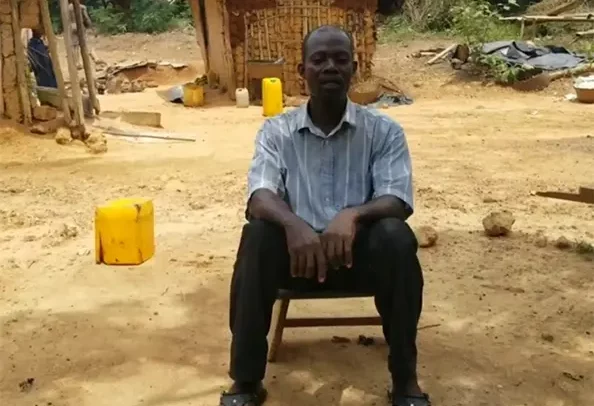Paul Yaw Kyeremeh
“My brother-in-law introduced me to cocoa farming, helped me to acquire land, about four (4) years into cocoa farming, this sickness set in. I visited the hospital, and the doctor diagnosed me with glaucoma. I tried all means but didn’t get a cure for it because I was late in reporting the illness. “I am now blind,” Paul Yaw Kyeremeh, a devout cocoa farmer battling glaucoma shared.
Born in Wamfie, the district capital of Dormaa East in the Bono Region of Ghana, Paul Yaw Kyeremeh had his primary and elementary education at Konte CHED. In the course of his education, he lost his dad at an early stage, forcing him to drop out of school to venture into agriculture, as his mother didn’t have the financial means to support him after school.
Agya Paul, as he was affectionately called, wentintomaize farming, where he got married and had four children. The brother in-law Agya Sekyere introduced him into cocoa farming. “He told me that the maize farming won’t fetch enough money to even cater for any immediate emergency but the cocoa farming can save me even in my old age. So,he led me and helped me to acquire a land for the cocoa farming, and four years into the cocoa farming, this sickness set in,” he stated.
Agya Paul revealed that he had some signs of glaucoma, which has to do with severe pain in the eye, but attributed it to stress from the farm.
“When the sickness came, I visited the hospital so many times, until the doctor finally told me I was suffering from glaucoma. I tried all means, but I didn’t get a cure for it. I am now blind; I am very pitiful and cannot work again. All the goods are now stacked in the bush,” he said.
With the hope that after his illness, he could get some help from his cocoa farming to cater for his household, Agya Paul stated that price instability, pest attack, climate change and lack of support from both the Ghana Cocoa Board (COCOBOD), authorities and family, has affected production hence resulting in his inability to cater for his family.
“I have stopped work ever since I lost my sight. All my efforts have gone to waste. My wife now handles everything from weeding to farming everything, to the extent of getting buyers to buy before we get to eat in the house. My children and I are now pitiful. I can’t even afford their schooling now,” he said.
Despite the challenges, Agya Paul has resisted lucrative offers to sell his farm to illegal miners (galamsey operators). His brother-in-law’s words have kept him committed to his farm, which he believes will secure his future.
He is not alone in these struggles. Many cocoa farmers in Ghana face health challenges that affect their ability to farm actively. Despite their hard work and dedication, these farmers often lack a safety net to support them in old age. The lack of a pension scheme leaves many farmers uncertain about their financial security in old age.
Ensuring that farmers have an insured life has been one of the difficult areas, as successive governmentshave made several promisesand announced initiatives that do not really see the light of day due to the high risk in the sector where success partly depends on natural issues of pests and diseases, coupled with matters of climate change.
For 40 years, COCOBOD has been planning to establish a pension scheme for cocoa farmers nationwide, as mandated by the COCOBOD Act. This scheme would provide financial security for farmers like Agya Paul, who have dedicated their lives to cocoa production.
On August 6, 2024, COCOBOD commenced the pilot phase of deducting 5% of cocoa farmers’ contributions to the Cocoa Farmers Pension Scheme, paving the way for a nationwide rollout during the main crop season starting on October 1, 2024.
In helping tackle the health of farmers in rural Ghana, the former Chief Executive of COCOBOD,Joseph Boahen Aidoo during the Cocoa Clinic @50 Symposium held at the University of Professional Studies, Accra (UPSA) in 2023, stated that the institution has plans to expand its healthcare facilities in cocoa-growing communities in the country as part of efforts to enhance access to quality healthcare for cocoa farmers.
Hepromised that the institution is considering building various Cocoa Medical Centres with state-of-the-art facilities to meet the diverse health needs of farmers and their dependents.
He also hinted at plans to upgrade the six existing Cocoa Clinics to be able to provide at least a secondary-level healthcare service.
Those promises are yet to materialise and the change of government, which resulted in a change in the management of COCOBOD, means new promises all over again. With new government in place, many of these farmers are calling on the new CEO of COCOBOD, Randy Abbey to expedite the completion of health projects which was initiated by the then government in their quest to prioritise farmers’ wellbeing.
BY Prince Fiifi Yorke


